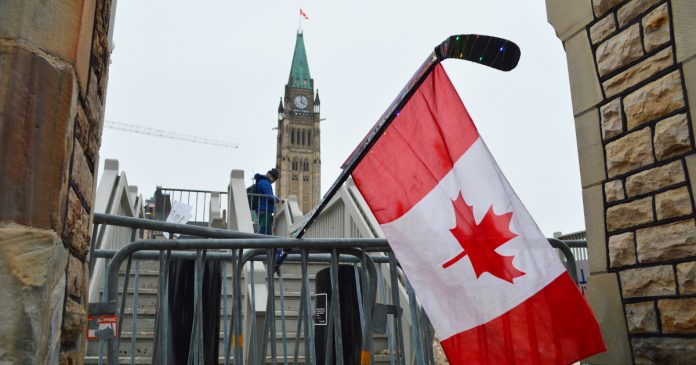In a country once globally revered for its commitment to freedom and democracy, Canada finds itself entangled in a disturbing transformation—a crisis that stretches beyond public health to encompass failures of governance and the erosion of democratic ideals. Tamara Lich, Chris Barber, and the Coutts 4 serve as the flashpoints.
The Coutts 4 have been held in detention for over 560 days without a bail hearing. It’s not merely unusual; it’s a flagrant assault on the very essence of democratic judicial proceedings
The trial of Tamara Lich and Chris Barber started this week. It begs the question: How did the great nation of Canada veer so far off its democratic course?
Why isn’t the Canadian government’s freeze of financial assets without warrant, charges, or conviction on trial? Why isn’t there a public inquiry into the government’s disastrous handling of the Covid-19 pandemic? Why no curiosity into where the Emergency Management Organizations – groups specially designed to manage such crises – were?
No, instead it’s Tamara Lich and Chris Barber who are on trial.
While many Covid fines and charges are quietly being dismissed nationwide, individuals like Lich and Barber remain in the state’s crosshairs. It’s as if the government is using them as cautionary tales, warning the public: “Raise your voice, and you’ll face disproportionate consequences.”
In the case of Lich and Barber, all the federal government had to do was talk to us – but it refused outright. Why? To fabricate a Canadian January 6th. They didn’t want dialogue; they wanted division. After two years of protesting and enduring coercion, job losses, and vaccine passports that barred us from the basic resources of society – all without receiving any acknowledgment – our demand to be heard transformed.
It became more than just a plea; it became a rightful insistence, exactly as it should for any citizen pushed to such extreme limits.
For the skeptics, the term “Problem Reaction Solution Paradigm” might echo in your ears. It suggests that governments may intentionally fuel problems, only to offer solutions that conveniently bolster their authority. The government’s failure to engage EMOs only amplifies public suffering, either by strategic design or sheer incompetence.
But here’s the gut-punch: the individuals paying for these governmental mishaps aren’t high-ranking officials. No, they’re everyday Canadians like Lich and Barber. These are the folks standing before the judicial guillotine because they dared to exercise their democratic right to protest.
Let me crystalize this for you: Even if you disagree with Tamara Lich or Chris Barber, their right to protest is your concern, too. If you’re silent today when their rights are being infringed, don’t be surprised if you find your own liberties in jeopardy tomorrow.
Whether in Ottawa or Washington, D.C., it’s clear: governments are more committed to maintaining their public image than upholding the democratic processes they’re meant to safeguard. It’s not just undemocratic; it’s un-Canadian.
We’re staring at the disintegration of the principles that make democracy function. When governments prefer to silence their citizens rather than engage with them, we must ask: What’s next? Who’s next? If you believe that avoiding the front lines of protest shelters you from the corrosion of democratic values, you’ve misunderstood the gravity of the situation. Our democracy is endangered, and it’s high time we acted to restore it before the damage becomes irreversible.
Tom Marazzo is the author of “The People’s Emergency Act,” available on Amazon September 6th.





















